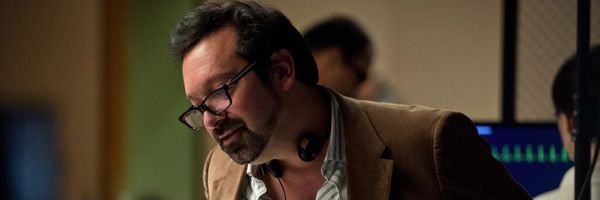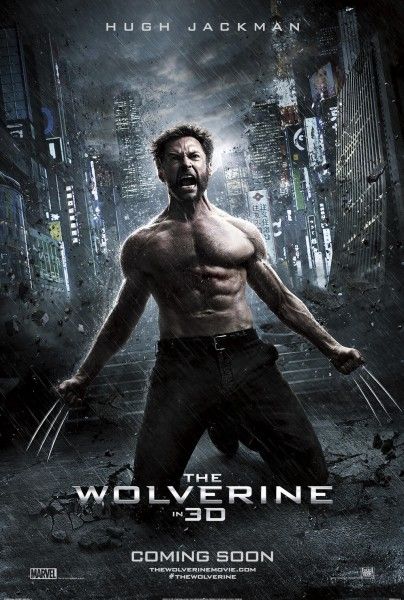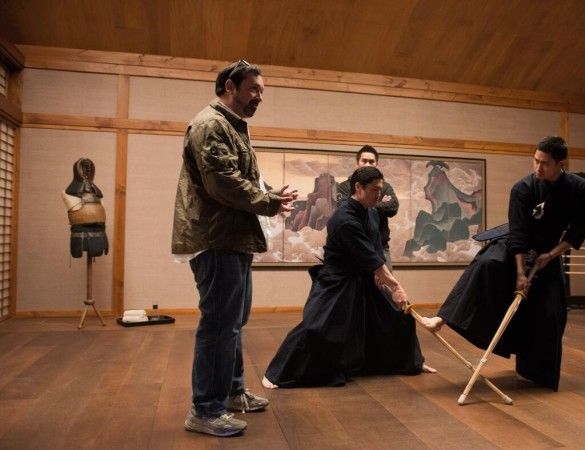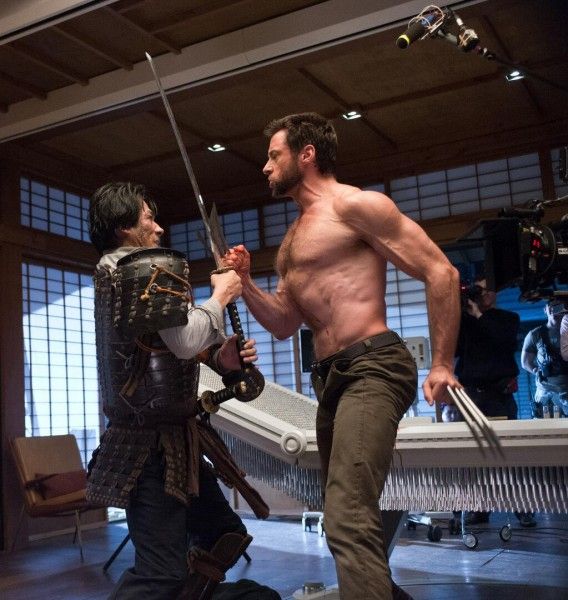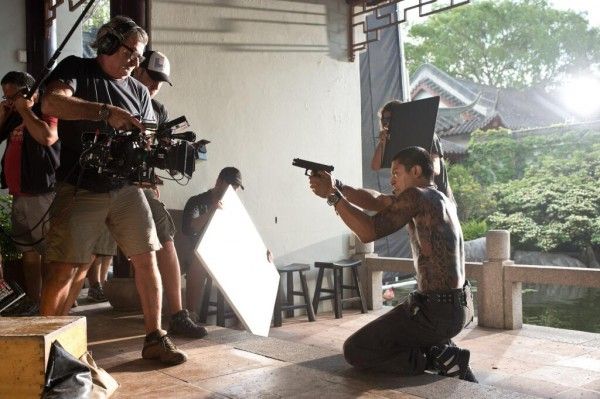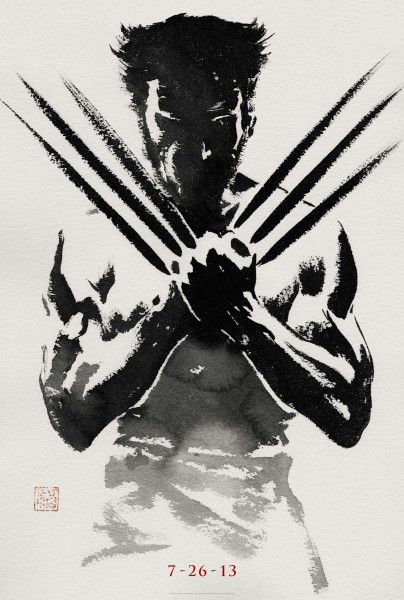During a fantastic group interview with The Wolverine director James Mangold last year on the Sydney set, he explained his reasons for wanting to tackle this project and what interested him about the character.
"What was most interesting about his character is this concept of his immortality and his healing. The fact that there's a kind of exhaustion that sets in when you're here forever, when you lose everyone you love. What I wrote when I met with Fox in the back of my script were like six or seven words, which were 'Everyone I love will die.' But I felt the story I wanted to tell was about a man who in a way felt cursed and that everyone he had ever cared about in the world, whether it be the people he fought with as part of the X-Men, his wife, or others, had perished, and that the curse…this idea that we all kind of yearn or wish for immortality, but the curse of actually having to be on the Earth like a god forever is its own purgatory, its own hell, which is to have to see everything you love go away, and have to keep reconnecting and re-finding inspiration."
Mangold also talked about wanting to make a character-centric film as opposed to something where the characters are fighting to save the planet, putting together his cast, his thoughts on the last Wolverine movie, why he used the ARRI Alexa, 3D, shooting the action scenes, Easter Eggs, and so much more. If you're looking forward to The Wolverine, you're going to love this interview. Hit the jump for what he had to say.
Before getting to the interview, watch the recent trailer:
Question: Are you satisfied with the takes?
JAMES MANGOLD: Am I satisfied with the takes? Every day, yes. Yes, every day you're satisfied, but everyday you're pushing for more. You're always looking, you're always searching, but I love shooting here and I love this environment a lot. It's very cool.
Rila -- We saw her, we met her, we looked at her costume, and then we saw a shot on the monitor and she seems to be breakout, like a fan favorite. Talk to us about her a little bit.
MANGOLD: Rila was someone -- we did a lot of searching for the cast, we wanted a lot of original faces -- and Rila was someone who when I first saw tape and photos of her, I thought it's such an amazing-looking woman. She actually had colored hair in some aspects that were already speaking to the role, but she's also so beautiful and so unique. And I was working with a friend on the script when this tape arrived and I was going, this is who it's going to be. I hadn't met her yet. I flew to Japan and met her and I was absolutely sure when I did that she was it. Amazing young woman, amazing.
I'm curious, obviously this project has been in development for a little bit, you finally got the gig, I'm curious how the script's changed over the years and how you put your stamp on it.
MANGOLD: The tricky thing in answering that would be I have to catalogue where it was, what changed.
That's what I'm looking for.
MANGOLD: That's huge. It's like Paul Ryan -- you don't want to get into those bunches of details. But the reality is that for me the focus of the movie was always about a very specific idea, which is that I wanted to place the film at the end of the timeline of all the existing movies and stories we've seen in the movies. Meaning that, I didn't want it to somehow be located in the middle of everything you've seen. I wanted to get past it all. I didn't want to hand off to a pre-existing story. I also was really interested in an idea that spoke to me from the original Claremont-Miller epic, which was the idea of finding Logan at a point when he had… To me, what was most interesting about his character is this concept of his immortality and his healing. The fact that there's a kind of exhaustion that sets in when you're here forever, when you lose everyone you love. What I wrote when I met with Fox in the back of my script were like six or seven words, which were "Everyone I love will die." But I felt the story I wanted to tell was about a man who in a way felt cursed and that everyone he had ever cared about in the world, whether it be the people he fought with as part of the X-Men, his wife, or others, had perished, and that the curse… I mean Isaac Asimov's Bicentennial Man speaks to it beautifully in a different way, but this idea that we all kind of yearn or wish for immortality, but the curse of actually having to be on the Earth like a god forever is its own purgatory, its own hell, which is to have to see everything you love go away, and have to keep reconnecting and re-finding inspiration.
And to me finding Logan in a place where his tank was empty, and that the man who killed his wife, that it's like there's a really interesting place to come in and find him. What the journey to Japan would then be if we could pick him up there. That's what I was most interested in. It also spoke to me in terms of influences I thought, ideas I thought. I love comic books. Since I was a kid, I've collected them. But I'm bored with the cutout of what the comic book movie is and I was going, If I was going to do this, I was thinking to myself, I really wanted to make more of a character-based film, rather than will Earth be destroyed, will the moon be destroyed, will a stadium be destroyed, will a city be destroyed. It's all kind of the same movie over and over again with some giant villain. To me, the idea of exploring the world of gods, which is what superheroes really are, mutants, superheroes are all in a sense touched people, bigger than people, immortal people that what's most interesting is to explore that and still be rooting for who they are, what they are and give a shit.
To me, any sequence in the arms race between movies of spectacle, the one way you're going to be more spectacular the next film is if the audience gives a shit. If you aren't just bludgeoning them with sound and fast cuts, but if they're actually emotionally invested in the outcome of the sequence they're watching. So again, to me the focus was how do I make it a film where I'm really invested in these people? So I thought about parallels to even things like The Outlaw Josey Wales. That's a movie where I'm starting with a character who has nothing, who's lost everything, who was unmoored. I watched samurai films and thought about then. And this idea of a ronin, the samurai without a master, which is exactly what Logan is, a kind of hero without a purpose, a hero without a mission. Does he even have interest in a mission anymore? Or is he so bored with the way mankind keeps fucking up that he has almost decided, What's the point? They just keep getting in more trouble. I think that's a really interesting place to start a film and a really interesting place for this character to go on a journey. So if that speaks to it at all, those ideas were the ones I was interested in bringing to the material and also pulling out from the existing material.
Everyone that we've spoken to today has said how clear your vision is for this film and that you really took them aside and explained what you want. What have you been saying to Hugh or to Rila?
MANGOLD: Well, I try and keep it simple. The other thing I try and do is I'm always trying to tailor it to who they are. You see the assets of your actors and you see their strengths and you try to play into them. It's like I feel part of my job is as a coach. I'm putting a team on the field and you want to formulate how to make the best game out of these players. But I wouldn't know how other than you can get the sense that I'm a pretty direct person. I love making movies and I'm pretty clear with them about what the scene's about. What is underneath it. Because I make dramas and because I'm not by trade a tentpole filmmaker, the thing I'd like to believe that I'm bringing is the same attitude that I've been bringing making Walk the Line or 3:10 to Yuma. That in a sense, the scene work is excellent, the moment to moment reality of these characters living, breathing, loving, touching, turning, feeling is real, not bullshit. To me that's been the biggest handicap of some of these films. No matter how many resources studios pour into them, there sometimes just isn't the ultimate special effect, which is a real live moment. To me, the challenge of even trying to sustain amid all the other spectacle is the really interesting challenge.
How was it to come to the project when your stars were already that deep into it?
MANGOLD: Well, I think I was really lucky in this movie and you see why. Hugh and I have been friends for years, but I think also he was really interested, as was I, in doing something that hadn't been done. Is it a reboot? No. If it were, it wouldn't be with Hugh. But the fact is that it's kind of rebooting with Hugh. It's the sense that we're making a standalone film. It fits into the universe. It doesn't deny the world, but it also is its own film. The liberating journey to another country has also freed us from the shackles to a lot of standard sequel making. It's a movie on its own from the moment it fades in to the moment it fades out. The aspect that I think we've gained from is we don't have the burden of doing the origin story. We can actually start in media res. We can start in action. We can just start telling you a story. When I opened 3:10 to Yuma, I didn't do how Russell [Crowe] became Ben Wade, I just started the movie. That can be the huge burden on these films, that there's this double tax on them to explain how these people… Like Superman. Brilliant film. Donner's Superman is two movies in one, kind of jammed together. Origin story and then the Lex Luthor battle story. That's a cumbersome thing to try and do in a movie. Very often, I think studios want a twofer. They want you to set up the character and also do the ultimate battle. What was really freeing about this for me was we could just start right away in action with this character that everyone knows.
Hugh isn't very secretive about being 100% happy with the last one. Did you two have an open talk about what, in his mind, was missing from the last one?
MANGOLD: I certainly in public I don't really get into knocking other people's movies. That's exactly what you're asking me to do. The fact is that what I would say is that we've talked a lot about what we hoped this one would be. What we hoped this one would be is something that many other X-Men films or otherwise haven't been in some ways. But I see that as much a function of my own sense of what I'm interested in in style in this particular story. But certainly, I think the opportunity I saw here was a great actor in one of the roles of his life who maybe hasn't done it yet, who hasn't done the one, the one that hits it out. That's a huge opportunity for me and as a friend to go, we don't have to deal with nine other members of the X-Men. This is about you. So that investment and the actual real estate from the running time in the movie means we can go a lot deeper than I think people have gone before. Both of us were really looking forward to that.
Can you talk a little bit about why you chose to use the ARRI Alexa and your thoughts on 3D post-conversion?
MANGOLD: The ARRI Alexa I've used on two pilots and commercials and I've loved it. I've loved a) it's low lightability. What I wanted for this movie was a rawness. I didn't want to feel… I wanted to feel like this film was urgent and happening now. I didn't want it to feel like every set-up is some kind of studio set-up or every fight is only about cables and rigging. I wanted it to feel gutsy and handheld and very urgent. I thought that the equipment you're describing was going to assist me on that. We were shooting anamorphic, which is something I very much wanted to do. In using combination old-anamorphic lenses that are 30, 40 years old on top of brand-new Alexas, which is a really interesting combination.
A lot of filmmakers are doing that now. It gives it a very unique look, a very cool look.
MANGOLD: I did it in Walk the Line. To go back even further, we used lenses pre-multicoated. So a lot of the lens flares you were seeing from Walk was doing the concerts and stuff when the spotlights were moving were kind of pre-lens coating, so you were getting extra flare. That was the main thought. Also, for me I do love, the one aspect I do love about digital is I love to push performance and I love to roll and roll and keep doing takes in a single performance. You don't see as much of that today doing pieces of action, but it's hugely… Something Bob De Niro taught me a long time ago, which is just that every time you say cut, a hundred people descend and tweak. And if you don't say cut, the actor stays there. They're in that moment. They stay there. You keep journeying in this emotional space without allowing all the tweakage to come back in. Having the kind of infinite loop of what a digital stream is -- you can shoot for a long time without cutting -- allows me to sometimes perform these really exciting things.
What about the 3D?
MANGOLD: 3D is a brand-new experience for me, something the studio is very excited about for the film and I'm very excited about how it might play for the martial arts stuff we're doing. My own sense and taste in 3D films has been I don't really like it when it feels like it's a gimmick and it's coming at me, it's flying at me. What really did it for me was Prometheus. It was incredibly well done. So I'm very curious about that. But it's my first experience. I'm glad on a movie like this that I'm getting a chance to taste what it's like. We never could have afforded to do it 3D in production. This movie is a risky movie. It's got a lot of foreign language. It's got a cast that's 9/10's not American. All those things make studios feel that they're taking a little more of a risk. It's a character-based film. There isn't some obvious uber-villain that everyone's heard of who's going to be reigning through the film. So a lot of the aspects of the movie become elements of risk that they have asked us to make for a little less than some tentpoles might be. So the idea of shooting in simultaneous 3D was always off the table. For me it's also the freedom that they've really set us free to make the exact movie we want to make.
You've given us a bit of it, but I would love to hear you to talk about the language in the film. Some of the things you've said and some of the inferences I've picked up from that list of films you said, so if you could expand on the visual.
MANGOLD: Black Narcissus, you take a couple of very Western characters and you drop them into a far Eastern land where desire, sex, mystery, murder, all are suddenly infecting them, changing them. This movie does all take place in Tokyo by the way. We journeyed to some of the hinterlands in Japan, so there's a naturalistic experience happening as well and that connection to nature. But there's something about that film and the way also… I think when you actually see this film's staging, Mike Powell and Emeric Pressburger's staging of that climactic sequence with the bellower, which is a real influence on some of the stuff that I'm doing here, but the exotic nature, the nature of that movie is the film travelogue, the film taking familiar characters and plunging them into a really unknown universe with new rules, new culture… If you haven't seen this film, it's one of the most sexy films about nuns you'll ever see in your life. It's a great film.
The lipstick scene.
MANGOLD: Yeah, it's a great scene with her putting lipstick on. It was also very influential on me when I was making Girl, Interrupted. There's a lot of movies that… In that case, it was not an exotic locale, but it was a lot of women in a confined space.
Let me quickly ask you about the language.
MANGOLD: I don't know how to answer that question other than to describe my influences. How would I describe my visual language, I don't know. I think I want to be in there. I want to feel these characters on the inside Logan. This is a movie where… The funny thing about me is I move from genre to genre, but I essentially shoot all the movies the same way. I shoot Walk the Line exactly the same way as I shoot 3:10 to Yuma. I don't try to affect a style. I find that I think that filmmakers get into trouble when they're watching too many DVDs and quoting all the time. John Ford wasn't quoting. He was just making the movie. The idea of doing doorway shots and always kind of quoting, it's like to me, just internalize all these movies and then make your movie and see what all those influences do on you, if that makes any sense. I take movies as far-ranging as The Professional or Chinatown. This movie has a lot of Chinatown in it to me. Logan is cynical, disillusioned, and there's a labyrinth of women and lies and deceit. Is falling in love or is he falling into a hole? These are all questions that will destroy him. Or is this something that will save him?
For me the biggest influence has been making a noir film in Japan. All these other things are just parts of it to me. The noir film and the Western to me are incredibly close together. What's in front of the lens changes, but the way you shoot them… The gunman walking on a wet brick street with a single light is not all that different than the gunman walking on a dusty street with a single Winchester. The stylized nature of those movies is not all that different. The kind of style they each possess is different, but the language is not that different. I would say that I'm very much living and breathing in the world of the Western noir film, both in the sense that I want this film to have actual romance. I want this film to have actual sensuality. And danger. I don't want it to live only on the bombast of its action sequences although that's all going to be there.
In the action scenes are you looking forward to new creative ways of putting together set pieces?
MANGOLD: It's all a part of it. For all my talk of wanting to do a well-acted film and a naturalistic film and a film that's urgent, you also owe yourself. I want to make a movie I want to see and that I think fans want to see. So there's been a good amount of imagination put to it. My difference is I don't want it for gimmick's sake. I think that sometimes that's already gone too far. Some things I have seen in these movies, I don't believe they can do that. It's the computer-aided credibility. When I read comics, I love believing what my heroes can do, but I love believing that they're still flesh and blood, whether they were inside some uniform or not, that there was some reality to when they hit a wall or brick or anything, that still fucking hurt. Within the realm of that I think we've got some great ideas, some great set pieces that I'd hate to describe. It's some cool stuff. And we'll definitely be having fun with the blades.
Is it allowed to be R rated or does it have to be PG-13?
MANGOLD: I'm not going to comment on that. Certainly he does get bloody. Things have repercussions. You get hit, it hurts. You get cut, you bleed. For me the instantaneous nature of healing is something that I think got carried to such an extent that I felt like it's almost like there's no stakes for the character. What I wanted to find again was this idea that it hurts to be Logan. It's not free of pain. Just because your leg might heal doesn't mean it doesn't feel broken. It doesn't mean that a car hitting your body doesn't hurt like the same it would hurt if a car hit your body. He's still flesh, blood, and nerves wrapped around that skeleton.
Were you familiar with this story beforehand? Did you have a childhood vision of how you saw the X-Men universe?
MANGOLD: I love Marvel and DC Comics, but I don't think I was ever so presumptuous to say I have a vision for the X-Men universe. Honestly my entry into this world is really at the beckoning interest of this particular saga, the Claremont-Miller saga. I'm always looking for what is going to make me interested and not feel like I'm doing a carbon copy of stuff that already exists. The idea of devoting two years of my life to making a corporate product that looks and smells and tastes like a lot of other things out there with just a different trademark character is a bore. If I understand the qualitative differences in this world that makes it unique, that makes it its own brand, that makes it its own idea, its own flavor, the sense of exoticness, of the world and the characters and the language, was what really made me want to make it. Otherwise these movies can be really… I don't know how you get through them if you don't have a specific reason for something unique you're going to do.
I'm curious about Easter eggs. Marvel movies are notorious for throwing the fans a little bit of extra. Obviously this is a Fox movie. Fox owns Fantastic Four, New Mutants, X-Men. They have a laundry list of characters. They could make their own Avengers movies with other characters. Obviously you're not going to give it away, but are there certain things you wanted to throw in as Easter eggs?
MANGOLD: Thoughts like that have occurred to me.
One last thing, if I can ask you, also there's a great cameo in X-Men: First Class and there's always the tags after the credits. When you're filming right now, are you already thinking about the tag after the credits?
MANGOLD: You're thinking all different things, but I will say that for me the tags after the credits thing has never been my favorite thing in movies. To me the idea is the curtain rises and the curtain comes down. In theater, there's the idea of the encore and I'm not opposed to it, but what I'm really focused on at this point is the majesty of the best films I see are films that don't panhandle for an extra laugh later, but actually deliver the goods. And when the screen goes black, you go, Yes. My goal, whether there's an egg for you later or not, is that when the thing goes black, that you go, Yes, that you say, Yes, the meal was good. I don't need a fancy wine. I don't need a dessert. I don't need an aperitif. What he gave me was satisfying. That's my hope and dream.
The Wolverine opens July 26th. For more from our set visit:
- 40 Things to Know About THE WOLVERINE From Our Set Visit
- Hugh Jackman Talks His Training Regimen, Finally Putting "the Real Wolverine" on Screen, the Comics Influence, and More on the Set of THE WOLVERINE
- Producer Hutch Parker Talks the Long Development Process, Continuing to Develop the Third Act During Production, and More on the Set of THE WOLVERINE
- Tao Okamoto Talks Making Her Acting Debut on an X-MEN Movie, Taking Advice from Hugh Jackman, and More on the Set of THE WOLVERINE
- Svetlana Khodchenkova Talks Playing Viper, Landing the Role, Her Costume, Working with Hugh Jackman, and More on the Set of THE WOLVERINE
- Rila Fukushima Talks Fight Sequences, Similarities to the Comic, Working with Hugh Jackman, and More on the Set of THE WOLVERINE

